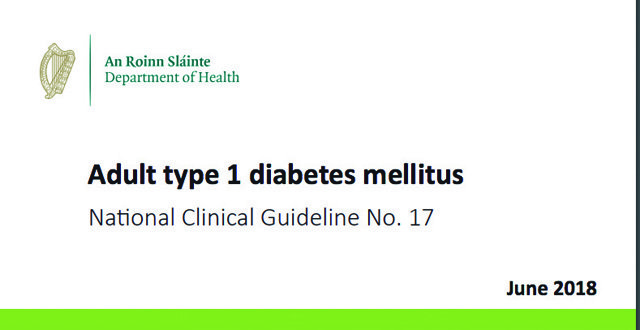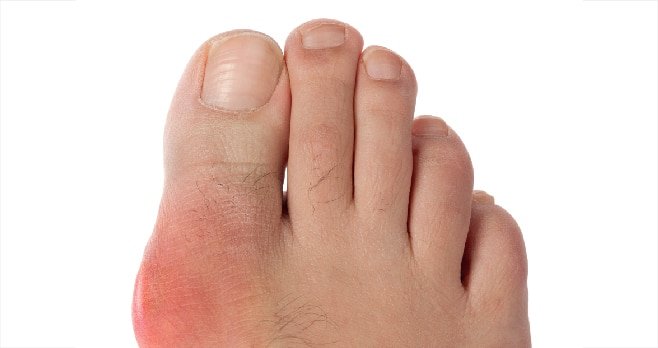<h3 class=”subheadMIstyles”>Background</h3>
In the absence of a national diabetes register it is estimated that there are 20,000 adults in Ireland living with type 1 diabetes, representing approximately 10 per cent of adults diagnosed with diabetes.
Current evidence shows the care of people with diabetes varies across Ireland. Care may be limited, unstructured and ad hoc in some locations, with limited access to specialist expert diabetes opinion in secondary care. Only 42 per cent of hospital diabetes services are currently offering adults with uncomplicated type 1 diabetes the recommended six-monthly review appointments. Instead many patients are offered only infrequent appointments focused on annual review (source: <em>HSE NCP National Survey of Diabetes Care Delivery by Acute Hospitals Diabetes, 2017</em> – unpublished).
Until this summer there were no national clinical guidelines for the management of type 1 diabetes patients. In June, Minister for Health Simon Harris launched the National Clinical Effectiveness Committee (NCEC)<em> Adult type 1 diabetes mellitus National Clinical Guideline No 17</em>.
As part of the process for developing the guideline, in 2017 an agreement was reached between the UK’s National Institute for Health and Care Excellence (NICE) and the National Patient Safety Office’s Clinical Effectiveness Unit, on behalf of the NCEC, to work together on the ‘contextualisation’ (whereby a recent NICE guideline is adapted for use in another country) of NICE’s clinical guideline (NG17) <em>Type 1 diabetes in adults: Diagnosis and management</em> (2015).
The NCEC type 1 diabetes guideline is the first to be developed in Ireland using the NICE contextualisation process. The recommendations are based on the best research evidence and on national and international clinical expertise.
This initiative was led by a group from the HSE National Clinical Programme on Diabetes, supported by the Department’s Clinical Effectiveness Unit and a team from NICE. The guideline was quality assured by the NCEC.
Chair of NICE, Sir David Haslam said: “Developing a national guideline on the treatment of a complex condition like type 1 diabetes is a costly and time-consuming process. NICE recognises that significant efficiencies can be made by sharing our products with colleagues in other countries, and supporting them to adapt our recommendations for their own health systems. Our partnership with the NCEC in Ireland on this project is an excellent example of joint working, which will help ensure that evidence-based care, tailored to the needs to the Irish population, is delivered across the country.”
Dr Kevin Moore, Chair of the Guideline Development Group said: “Type 1 diabetes care requires a multidisciplinary approach to care that empowers patients to successfully manage this life-long condition. Current evidence shows variation in how care is delivered across Ireland and so this NCEC National Clinical Guideline will standardise the approach with a special focus on patient education and clinical review. Overtime, this will mean better outcomes for patients with type 1 diabetes.”
This National Clinical Guideline applies to adults (aged 18 years and older) with type 1 diabetes in Ireland. It does not apply to children living with type 1 diabetes, adults living with type 2 diabetes or individuals living with monogenic (or other rarer forms of) diabetes. This guideline is relevant to all healthcare professionals working in healthcare settings delivering care to people living with type 1 diabetes.
The aim of NCEC Clinical Guidelines is to reduce unnecessary variations in practice and provide an evidence base for the most appropriate healthcare in particular circumstances. As a consequence of Ministerial mandate, it is expected that NCEC National Clinical Guidelines are implemented across all relevant services in the Irish healthcare setting.
The guideline will be updated three years from publication as per the process outlined by the NCEC.
<h3 class=”subheadMIstyles”>Implementation plans and costs</h3>
There are three key changes to service delivery that will occur as a result of implementation of these guideline recommendations and these were considered within the budget impact analysis.
Firstly, the national provision of a high-quality structured patient education programme to empower people with type 1 diabetes to effectively manage their diabetes and the external factors that can influence their blood glucose levels such as exercise and stress.
The DAFNE programme is the only structured education programme that is currently available in Ireland that meets all of the criteria of the clinical recommendations regarding structured patient education. There are currently seven DAFNE centres in Ireland. The expansion of DAFNE provision would entail the establishment of a maximum of 11 new DAFNE centres following successful implementation, at an estimated cost of €2.9 million over a five-year period. This estimate includes the anticipated recruitment costs for additional staff to deliver the programme as well as ongoing running costs and the potential savings due to improved outcomes. A UK economic evaluation found that DAFNE education was both cost-saving and more effective when compared with no DAFNE education. DAFNE education was also predicted to reduce the incidence of severe long-term complications such as nephropathy and neuropathy.
Secondly, to ensure implementation of the guideline, short courses for all staff who deliver care to people with type 1 diabetes in Ireland will be provided. The training would be delivered by the staff recruited to deliver the DAFNE programme and attendance of course participants would be facilitated through existing arrangements for training and development. The estimated budget impact for the short course was approximately €18,000 over five years.
Finally, the guideline recommends the standardisation of patient follow-up in diabetes clinics where patients are re-called at least every six months. Survey data has indicated that there is substantial variation to practice, with only 42 per cent of hospitals in Ireland currently offering re-call appointments at this frequency.
In order to meet the guideline recommendations an estimated additional 5,000 appointments would need to be provided each year, with an opportunity cost of €3.2 million over five years.
However, it is anticipated that the implementation of the <em>HSE (2018) National Model of Integrated Care for Type 2 </em>
<em>Diabetes</em> (awaiting publication) and the ICGP (2016) <em>A Practical Guide to Integrated Type 2 Diabetes Care</em>, which comprises the relocation of care of people with uncomplicated type 2 diabetes from hospital to primary care, could potentially address the capacity constraints within diabetes specialist clinics.
Some investment in primary care has already been made in the form of the HSE’s Diabetes Cycle of Care Programme, with almost €11.25 million paid to register and provide structured appointments for patients with type 2 diabetes in 2015 and 2016 alone, the document notes.
<div style=”background: #e8edf0; padding: 10px 15px; margin-bottom: 15px;”> <p class=”subheadMIstyles”><strong>Summary of guideline key recommendations</strong>
<p class=”subheadMIstyles”><strong>Diagnosis</strong>
Diagnose type 1 diabetes on clinical grounds in adults presenting with hyperglycaemia, bearing in mind that people with type 1 diabetes typically (but not always) have one or more of:
<p class=”listBULLETLISTTEXTMIstyles”>Ketosis;
<p class=”listBULLETLISTTEXTMIstyles”>Rapid weight loss;
<p class=”listBULLETLISTTEXTMIstyles”>Age of onset below 50 years;
<p class=”listBULLETLISTTEXTMIstyles”>BMI below 25kg/m;
<p class=”listBULLETLISTTEXTMIstyles”>Personal and/or family history of autoimmune disease.
Do not discount a diagnosis of type 1 diabetes if an adult presents with a BMI of 25 kg/m or above or is aged 50 years or above.
Do not measure C-peptide and/or diabetes-specific autoantibody titres routinely to confirm type 1 diabetes in adults.
Consider further investigation in adults that involves measurement of C-peptide and/or diabetes-specific autoantibody titres if:
<p class=”listBULLETLISTTEXTMIstyles”>Type 1 diabetes is suspected but the clinical presentation includes some atypical features (for example, age 50 years or above, BMI of 25 kg/m or above, slow evolution of hyperglycaemia or long prodrome);
<strong>or</strong>
<p class=”listBULLETLISTTEXTMIstyles”>Type 1 diabetes has been diagnosed and treatment started but there is a clinical suspicion that the person may have a monogenic form of diabetes, and C-peptide and/or autoantibody testing may guide the use of genetic testing;
<strong>or</strong>
<p class=”listBULLETLISTTEXTMIstyles”>Classification is uncertain, and confirming type 1 diabetes would have implications for availability of therapy (for example, continuous subcutaneous insulin infusion [CSII or ‘insulin pump’] therapy).
When measuring C-peptide and/or diabetes-specific autoantibody titres, take into account that:
<p class=”listBULLETLISTTEXTMIstyles”>Autoantibody tests have their lowest false negative rate at the time of diagnosis, and that the false negative rate rises thereafter;
<p class=”listBULLETLISTTEXTMIstyles”>C-peptide has better discriminative value the longer the test is done after diagnosis;
<p class=”listBULLETLISTTEXTMIstyles”>With autoantibody testing, carrying out tests for two different diabetes-specific autoantibodies, with at least one being positive, reduces the false negative rate.
<p class=”subheadMIstyles”><strong>Education and information</strong>
<p class=”listBULLETLISTTEXTMIstyles”>Offer all adults with type 1 diabetes a structured education programme of proven benefit, for example, the DAFNE (dose-adjustment for normal eating) programme. Offer this programme six-to-12 months after diagnosis.
<p class=”subheadMIstyles”><strong>Blood glucose management</strong>
<p class=”listBULLETLISTTEXTMIstyles”>Support adults with type 1 diabetes to aim for a target HbA1c level of 48mmol/mol (6.5 per cent) or lower, to minimise the risk of long-term vascular complications.
<p class=”listBULLETLISTTEXTMIstyles”>Agree an individualised HbA1c target with each adult with type 1 diabetes, taking into account factors such as the person’s daily activities, aspirations, likelihood of complications, comorbidities, occupation and history of hypoglycaemia.
<p class=”listBULLETLISTTEXTMIstyles”>Support adults with type 1 diabetes to test at least four times a day and up to 10 times a day if any of the following apply:
<p class=”listBULLETLISTTEXT2MIstyles”>the desired target for blood glucose control, measured by HbA1c level (see guideline recommendation 3.6.6), is not achieved;
<p class=”listBULLETLISTTEXT2MIstyles”>the frequency of hypoglycaemic episodes increases;
<p class=”listBULLETLISTTEXT2MIstyles”>there is a legal requirement to do so, such as before driving, in line with the Road Safety Authority (RSA) (2014) <em>Sláinte agus Tiomáint Medical Fitness to Drive Guidelines</em>;
<p class=”listBULLETLISTTEXT2MIstyles”>during periods of illness;
<p class=”listBULLETLISTTEXT2MIstyles”>before, during and after vigorous physical activity;
<p class=”listBULLETLISTTEXT2MIstyles”>when planning pregnancy, during pregnancy and while breastfeeding, see the HSE (2010) <em>Guidelines for the Management of Pre-gestational</em> and <em>Gestational Diabetes Mellitus and the NICE</em> (2015) <em>Guideline Diabetes in pregnancy: Management from preconception to the postnatal period (NG3)</em>;
<p class=”listBULLETLISTTEXT2MIstyles”>if there is a need to know blood glucose levels more than four times a day for other reasons (for example, impaired awareness of hypoglycaemia, high-risk activities).
<p class=”listBULLETLISTTEXTMIstyles”>Advise adults with type 1 diabetes to aim for:
<p class=”listBULLETLISTTEXT2MIstyles”>a fasting plasma glucose level of 5-7mmol/litre on waking; and
<p class=”listBULLETLISTTEXT2MIstyles”>a plasma glucose level of 4-7mmol/litre before meals at other times of the day.
<p class=”subheadMIstyles”><strong>Insulin therapy</strong>
<p class=”listBULLETLISTTEXTMIstyles”>Offer multiple daily injection basal–bolus insulin regimens, rather than twice-daily mixed insulin regimens, as the insulin injection regimen of choice for all adults with type 1 diabetes. Provide the person with guidance on using multiple daily injection basal-bolus insulin regimens.
<p class=”subheadMIstyles”><strong>Awareness and management of hypoglycaemia</strong>
<p class=”listBULLETLISTTEXTMIstyles”>Assess awareness of hypoglycaemia in adults with type 1 diabetes at each annual review.
<p class=”subheadMIstyles”><strong>Care of adults with type 1 diabetes in hospital</strong>
<p class=”listBULLETLISTTEXTMIstyles”>Enable adults with type 1 diabetes who are hospital inpatients to self-administer subcutaneous insulin if they are willing and able and it is safe to do so.
</div>
<p class=”listBULLETLISTTEXTMIstyles”>For more information see: Department of Health (2018) <em>Adult type 1 diabetes mellitus (NCEC National Clinical Guideline No. 17)</em>. Available at: http://health.gov.ie/national-patient-safety-office/ncec.










Leave a Reply
You must be logged in to post a comment.